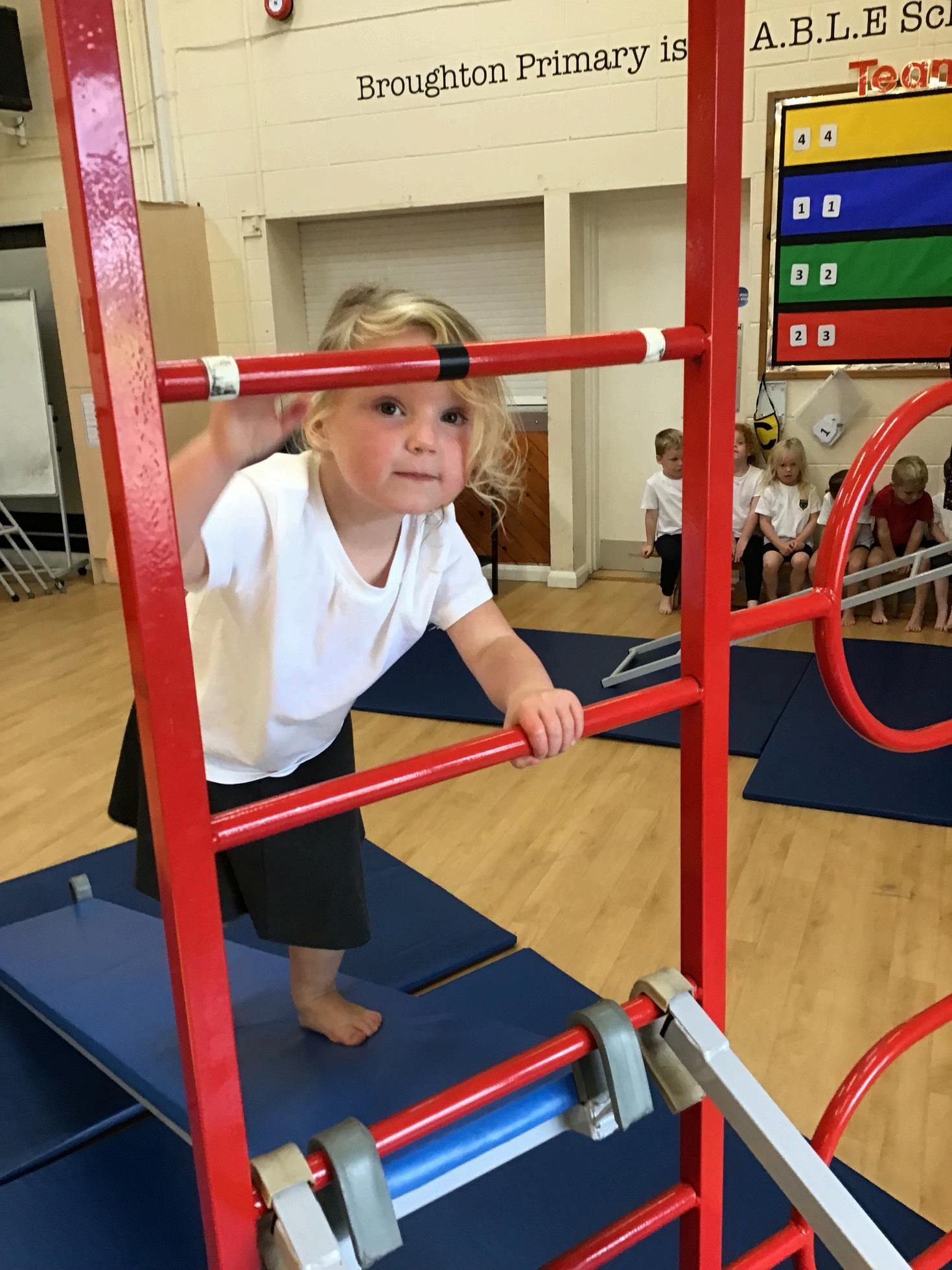
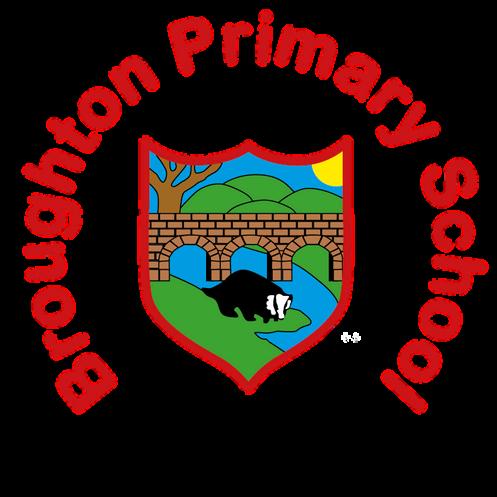



I would like to welcome you and your child to Broughton Primary School. Choosing a primary school is an important decision and this prospectus will give you an insight into the life and works of the school.
I hope you will give me the opportunity, if you have not already done so, of showing you around the school and answering any questions you may have.
Here at Broughton Primary School our philosophy for education is one which is based around doing the ‘best by every child’. We hold a strong child-centred approach to teaching, where consistency, praise, encouragement yet challenge is key. We believe that all children are amazing and have unique potential waiting to be unlocked – it is a privilege be able to inspire, enthuse, motivate and nurture children to fully achieve this.
We endeavour to take a holistic approach in delivering our Curriculum – quality teaching of ‘subjects’ is extremely important but we also aim to teach children about how to look after themselves and others in order to lead safe and happy lives in the future. School is also a place for children to make friends, laugh, challenge themselves, set personal targets and be supported in developing a sense of ambition and healthy well-being. Your child will be provided with experiences and opportunities to undertake enrichment activities which will enhance their learning about the world around them. We have very high standards of behaviour too, that ensures your child is given the best possible opportunity to learn in a happy, safe and calm environment.
We are very proud of our strong links with our parents and the wider village community and will offer a range of events throughout the academic year, in which you will be invited into school to celebrate the successes and achievements of our children.
I am looking forward to working with you to support your child in the future.
Yours sincerely
 Anna Bewsher Head teacher
Anna Bewsher Head teacher
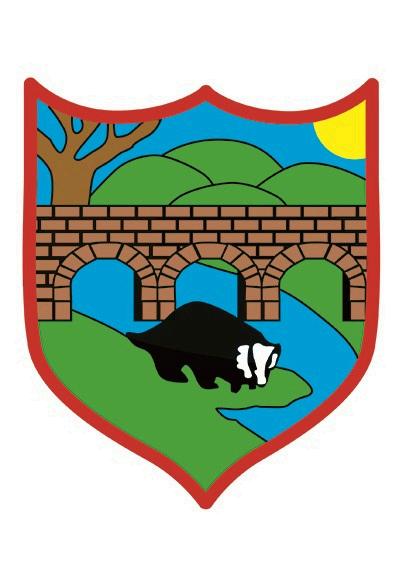
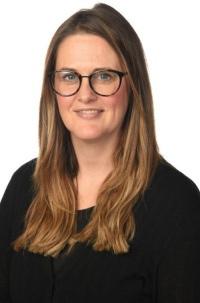

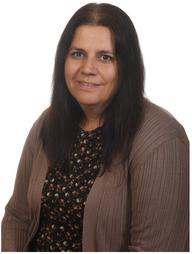
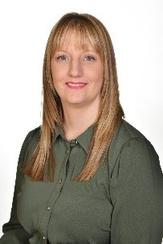
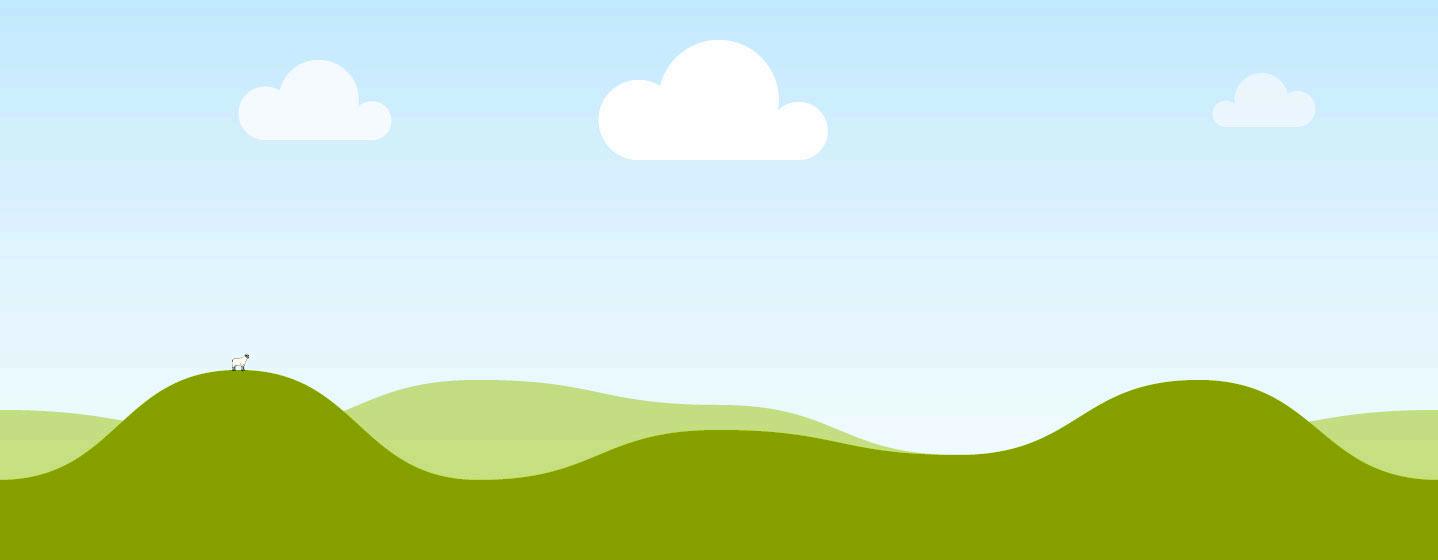
“The Early Years Foundation Stage (EYFS) sets the standards that all early years’ providers must meet to ensure that children learn and develop well and are kept healthy and safe. It promotes teaching and learning to ensure children’s ‘school readiness’ and gives children the broad range of knowledge and skills that provides the right foundation for good future progress through school and life.” (Early Years Framework)
FourguidingprinciplesshapepracticeinEarlyYearssettings:
·AUniqueChild–Everychildisuniquewhoisconstantlylearningand canberesilient,capable,confidentandself-assured.
·PositiveRelationships–Childrenlearntobestrongand independentthroughpositiverelationships.
· · Enabling Environments – children learn and develop well in environments which respond to their individual needs and there is a strong partnership between practitioners and parents/carers.
-Learning and Development –Children develop and learn in different ways. The framework covers the education and care of all children in early years’ provision, including children with special educational needs and disabilities.
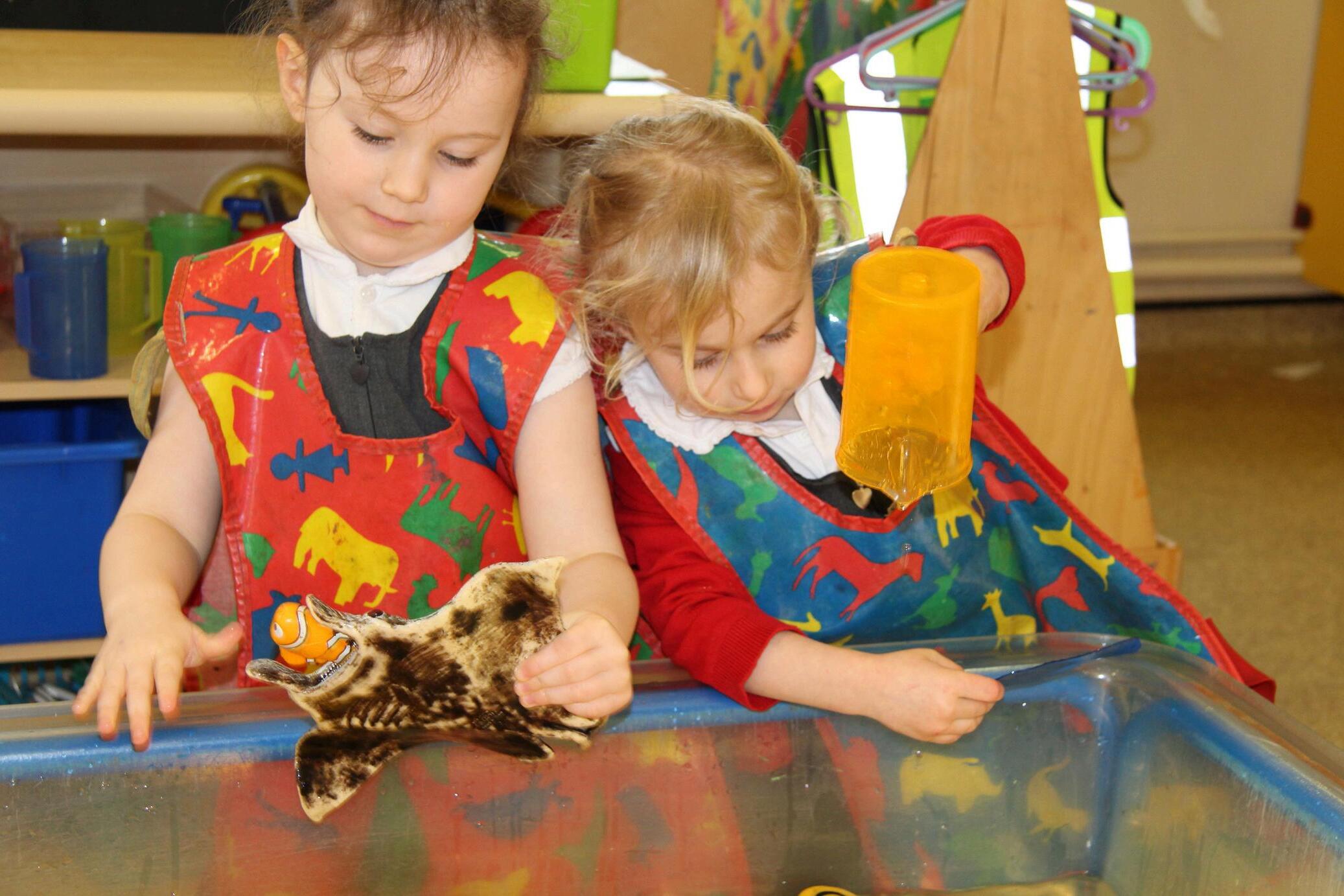
 Mrs Jill Johnston
Mrs Charlotte Black
Mrs Jill Johnston
Mrs Charlotte Black
There are seven areas of learning and development that shape educational programmes in early years settings. All areas of learning and development are important and inter-connected. Three areas, the prime areas, are particularly crucial for igniting children’s curiosity and enthusiasm for learning, and for building their capacity to learn, form relationships and thrive.
The PRIME AREAS are:
· Communication and language
· Physical development
· Personal, social & emotional develo
Then there are four specific areas thro which the prime areas are strengthene and applied.
The SPECIFIC AREAS are:
· Literacy
· Mathematics
· Understanding the World
· Expressive Arts and Design
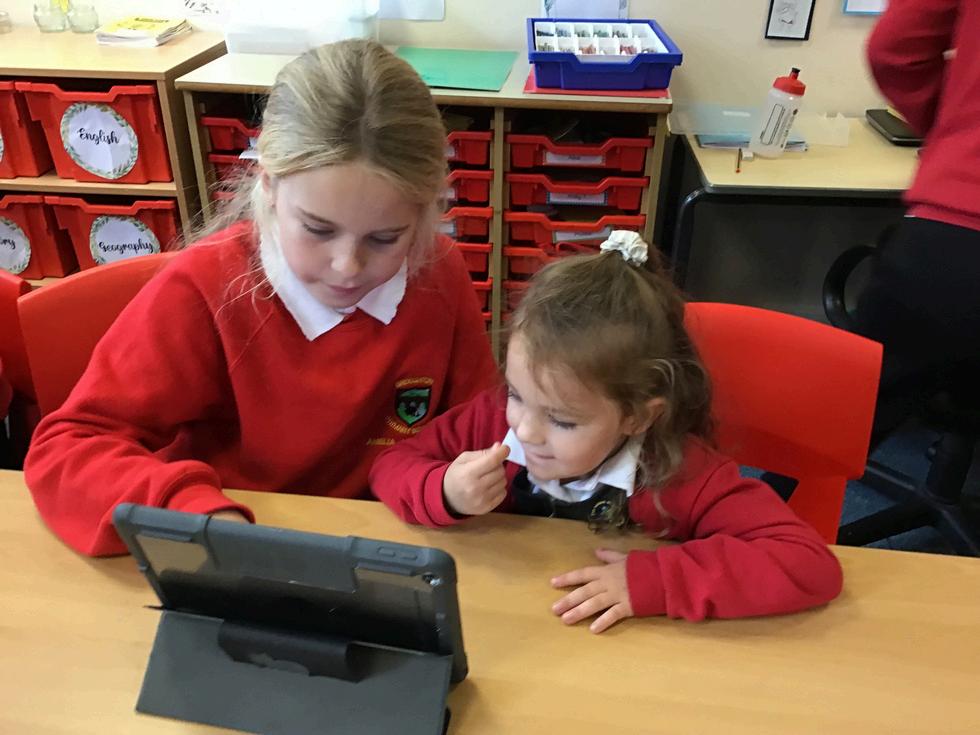
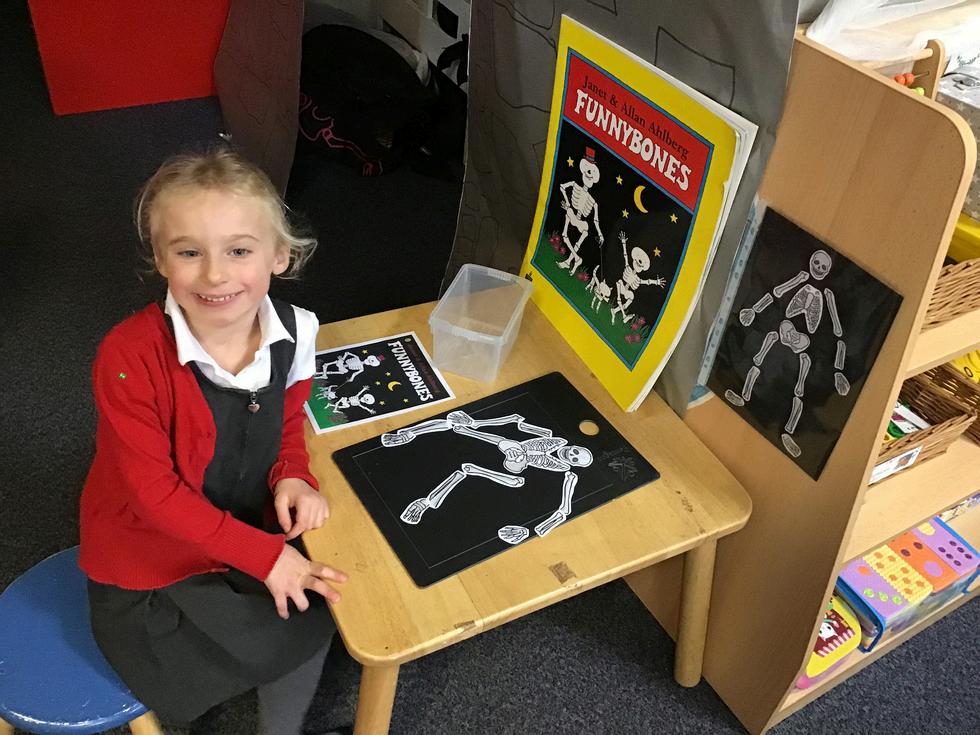
Each area of learning and development is implemented through planned, purposeful play and through a mix of adult-led and child-initiated activity. Play is essential for children’s development, building their confidence as they learn to explore, to think about problems, and relate to others. The individual needs, interests, and stage of development of each child will be considered in order to plan a challenging and enjoyable experience for each child in all of the areas of learning and development.
When planning and guiding children’s activities, consideration will always be given to the different ways that children learn and these will be reflected in classroom practice. These are, essentially, how children learn and are referred to as the ‘characteristics of effective learning’.
Playing and exploring – children investigate and experience things , and ‘have a go’; Active learning – children concentrate and keep on trying if they encounter difficulties, and enjoy achievements; and
Creating and thinking critically – children have and develop their own ideas, make links between ideas, and develop strategies for doing things.
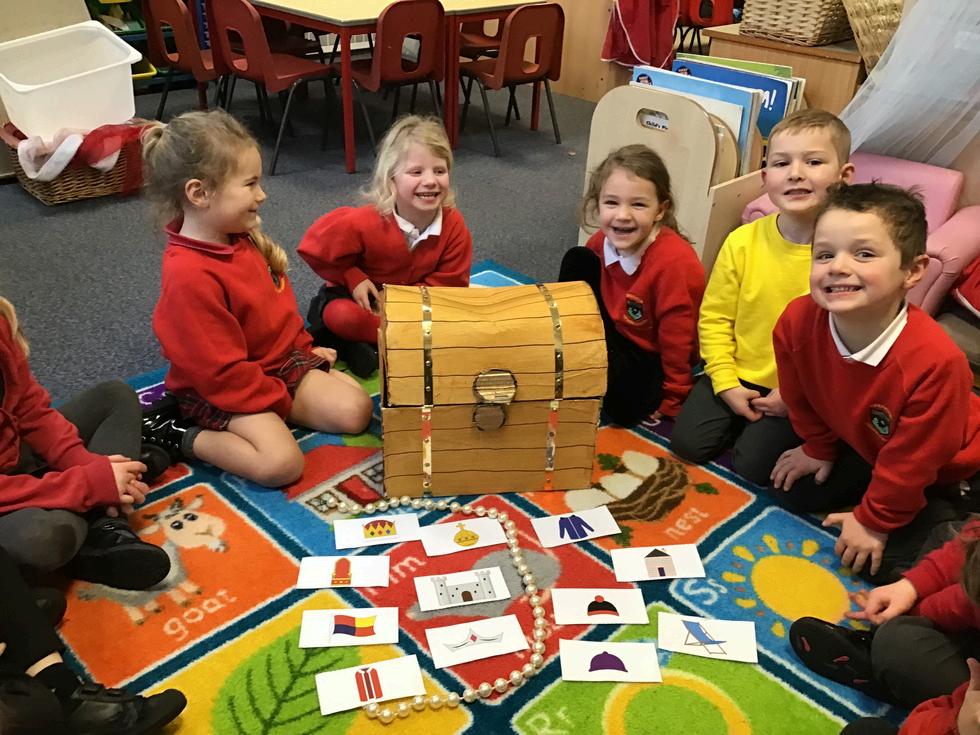
By the end of the EYFS pupils will learn to:
·Self-Regulation
Show an understanding of their own feelings and those of others, and begin to regulate their behaviour accordingly
Set and work towards simple goals, being able to wait for what they want and control their immediate impulses when appropriate
Give focused attention to what the teacher says, responding appropriately even when engaged in activity, and show an ability to follow instructions
·Managing Self
Be confident to try new activities and show independence, resilience and perseverance in the face of challenge
Explain the reasons for rules, know right from wrong and try to behave accordingly
Manage their own basic hygiene and personal needs, including dressing, going to the toilet and understanding the importance of healthy food choices.
By the end of the EYFS pupils will learn to:
Listen attentively and respond to what they hear appropriately
Make comments about what they have heard and ask questions to clarify their understanding
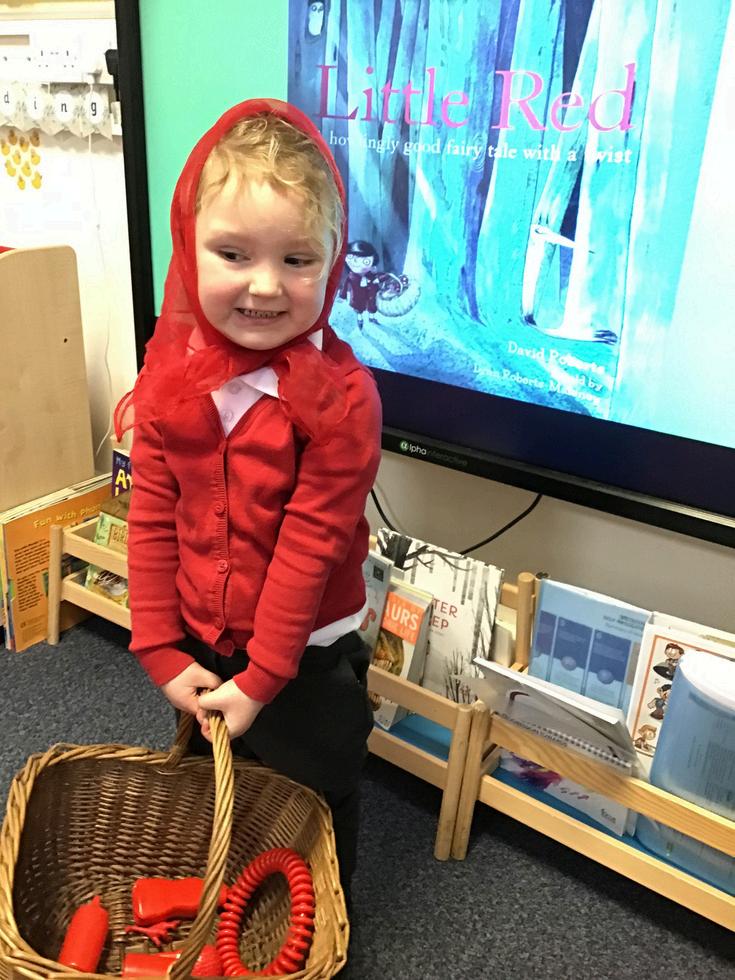
H ld ti h engaged in back-and-forth exchanges with their
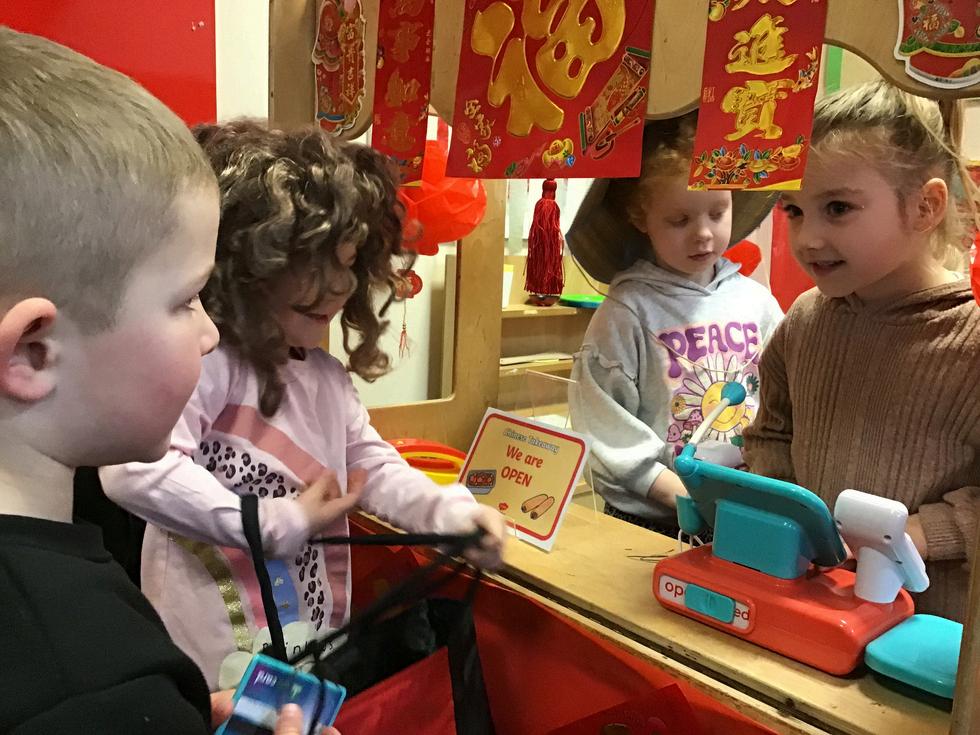
By the end of the EYFS pupils will learn to:
·Gross Motor Skills
Negotiate space and objects safely, with consideration for themselves and others
Demonstrate strength, balance and coordination when playing
Move energetically, such as running, jumping, dancing, hopping, skipping and climbing.
·Fine Motor Skills

Hold a pencil effectively in preparation for fluent writing
Use a range of small tools, including scissors, paint brushes and cutlery
Begin to show accuracy and care when drawing n school.
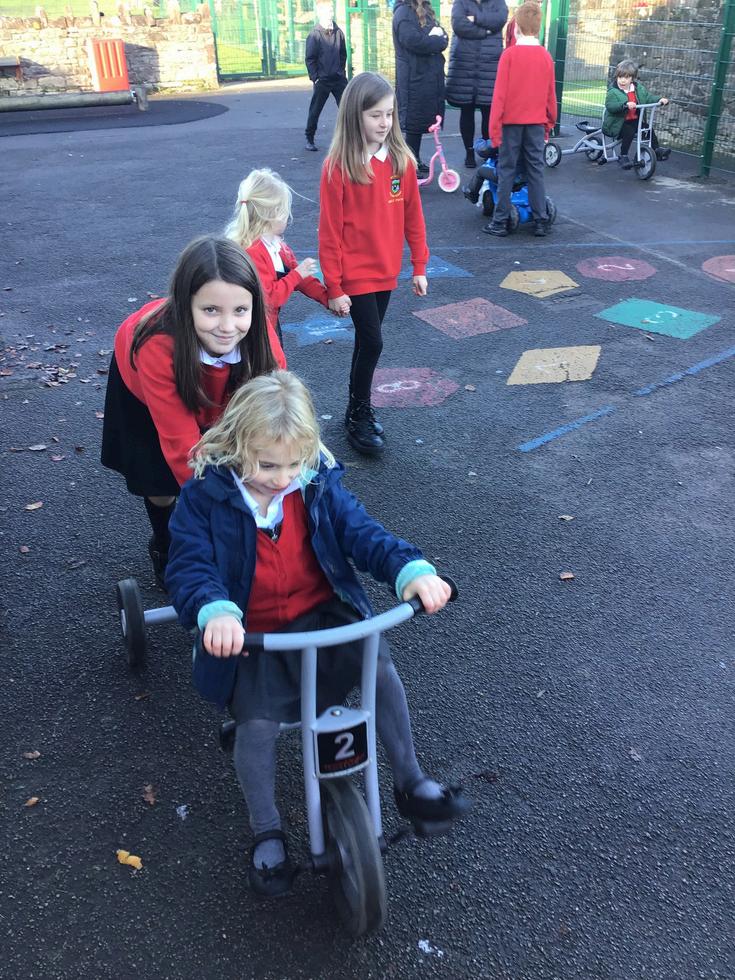
BytheendoftheEYFSpupilswilllearnto:
·Comprehension
Demonstrateunderstandingofwhathasbeenreadto retellingstoriesandnarrativesusingtheirownwordsa recentlyintroducedvocabulary
Anticipate–whereappropriate–keyeventsinstories
Useandunderstandrecentlyintroducedvocabularyd discussionsaboutstories,non-fiction,rhymesandpoe duringroleplay
·Word Reading
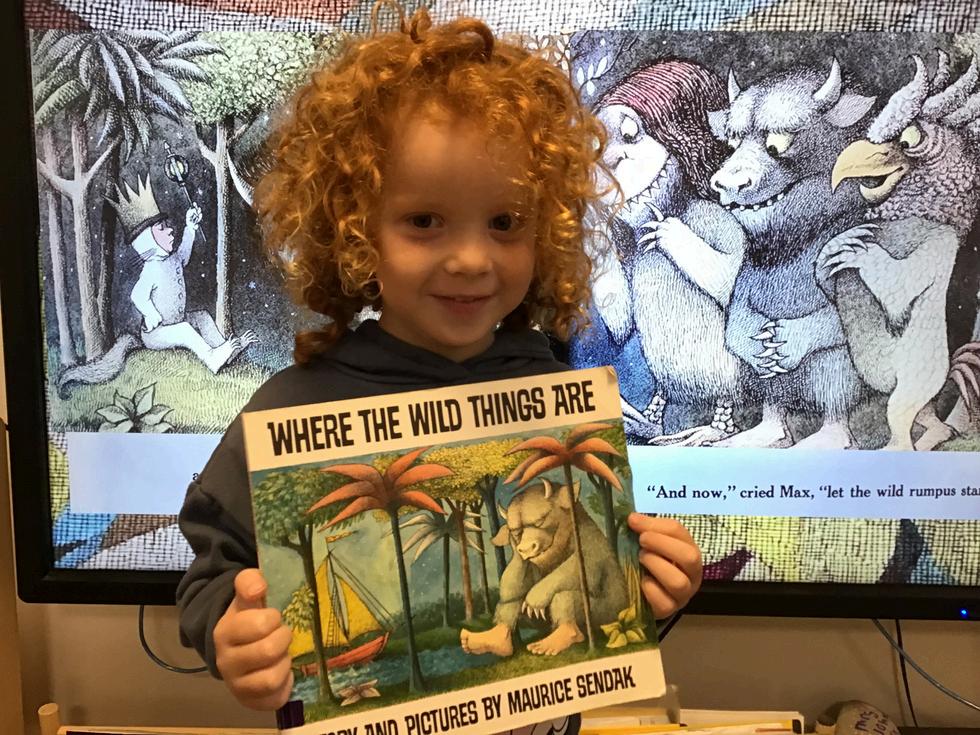
Sayasoundforeachletterinthealphabetandatleast10 digraphs
Readwordsconsistentwiththeirphonicknowledgebysoundblending
Readaloudsimplesentencesandbooksthatareconsistent withtheirphonicknowledge,includingsomecommonexception words.
·Writing
Writerecognisableletters,mostofwhicharecorrectlyformed Spellwordsbyidentifyingsoundsinhemandrepresentingthe soundswithaletterorletters
Writesimplephrasesandsentencesthatcanbereadby others.


We follow a structured phonics program called ‘Read, Write, Inc’. The children really enjoy the sessions and it has proven to be very effective for progress.
· In Nursery children start to learn letter sounds towards the end of the year. In Reception short sessions are delivered every morning and children will start to blend and segment sounds so they can read.
Further resources and information about phonics will follow at the start of the term.
“Readingisattheheartofthisschool.
PhonicsistaughtrightfromthebeginningwhenchildrencomeintoNurseryandReception.Pupilsgetofftoa goodstartintheearlyyearsandachievewellbytheendoftheReceptionYear”
BytheendoftheEYFS,pupilswilllearnto:
·Number
oHaveadeepunderstandingofnumbersto10,includingthe compositionofeachnumber
oSubitise(recognisequantitieswithoutcounting)upto5
oAutomaticallyrecallnumberbondsupto5andsomenumber bondsto10,includingdoublefacts.
·NumericalPatterns
oVerballycountbeyond20,recognisingthepatternofthe countingsystem
oComparequantitiesupto10indifferentcontexts,recognising whenonequantityisgreaterthan,lessthanorthesameasthe otherquantity
oExploreandrepresentpatternswithinnumbersupto10, includingevensandodds,doublefactsandhowquantitiescan bedistributedequally
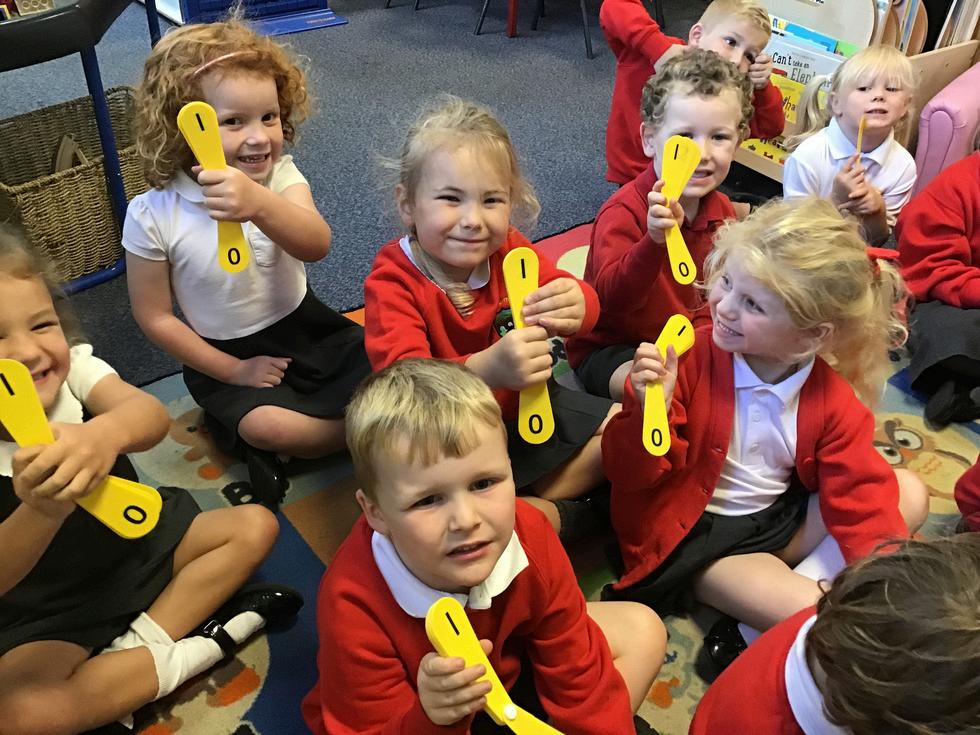
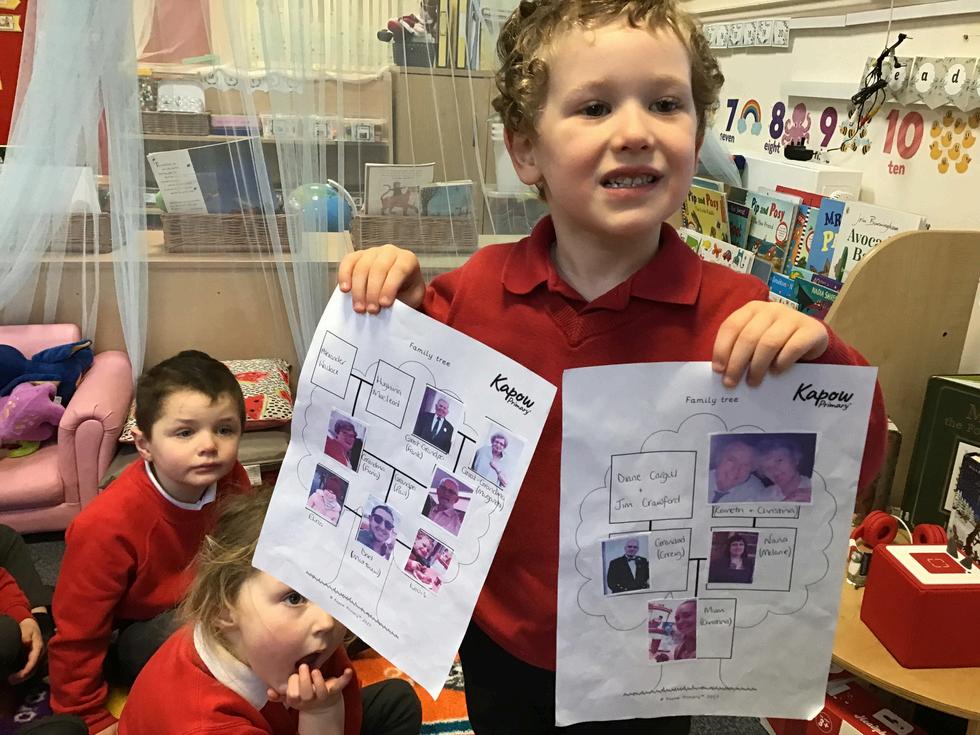
B th end of the EYFS pupils will learn to:
nd Present
k about the lives of the people around them and their roles in iety
ow some similarities and differences between things in the t and now, drawing on their experiences and what has been d in class
derstand the past through settings, characters and events ountered in books read in class and storytelling.
e, Culture and Communities
scribe their immediate environment using knowledge from ervation, discussion, stories, non-fiction texts and maps
ow some similarities and differences between different gious and cultural communities in this country, drawing on ir experiences and what has been read in class
lain some similarities and differences between life in this ntry and life in other countries, drawing on knowledge from stories, non-fiction texts and – when appropriate – maps.

Explore the natural world around them, making observations and drawing pictures of animals and plants
Know some similarities and differences between the natural world around them and contrasting environments, drawing on their experiences and what has been read in class
Understand some important processes and changes in the natural world around them, including the seasons and changing states of matter.
By the end of the EYFS pupils will learn to:
·Creating with Materials
Safely use and explore a variety of materials, tools and techniques, experimenting with colour, design, texture, form and function
Share their creations, explaining the process they have used
Make use of props and materials when rol playing characters in narratives and stories
·Being Imaginative and Expressive
Invent, adapt and recount narratives an stories with peers and their teacher
Sing a range of well-known nursery rhym and songs
Perform songs, rhymes, poems and stories wi others, and – when appropriate – try to mo in time with music
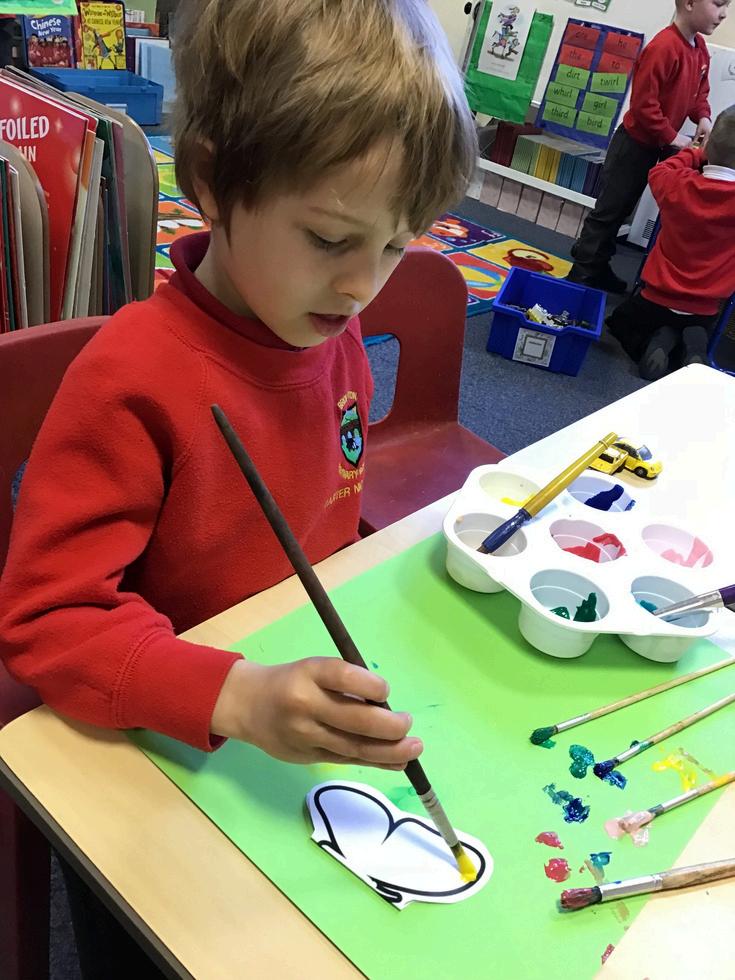

In the Autumn & Spring term we have weekly cookery session to help develop fine motor skills (chopping, cutting, mixing, rolling, etc.) as well as helping children to understand where food comes from, and to encourage an understanding of healthy eating. These sessions give children confidence to try new flavours & be adventurous with tasting something different.
Some of the recipes we have are gingerbread men, fruit kebabs, roast vegetables with basil dip, cheese pastry pinwheels, vegetable cous cous and shortbread. The children really enjoy their cookery sessions and love trying the results ev
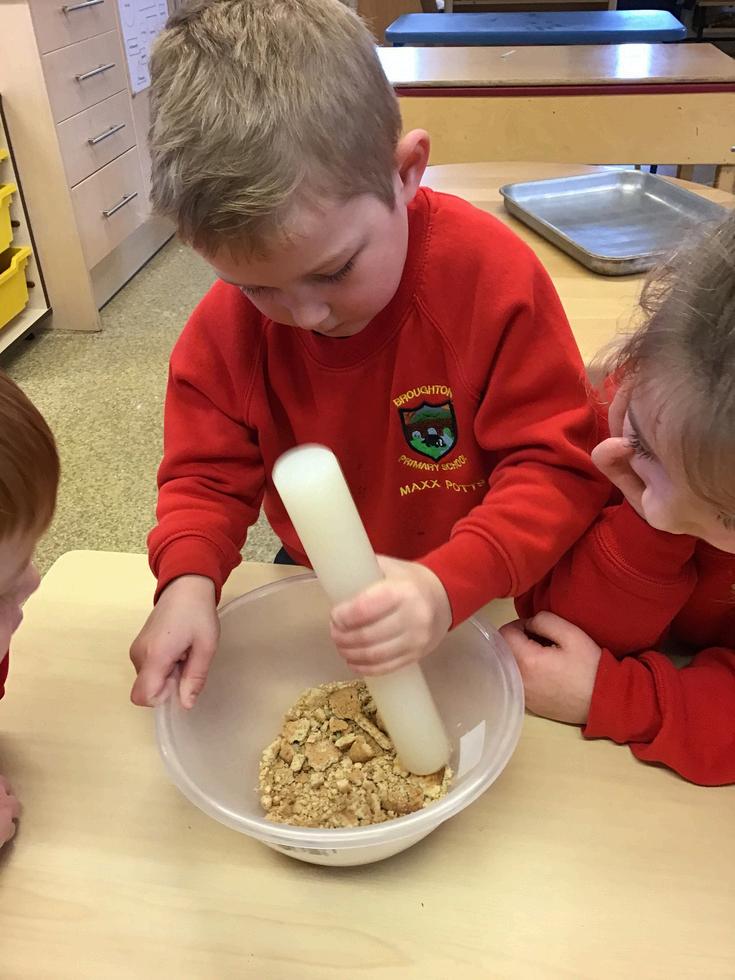


Children in Reception access weekly forest school sessions led by a qualified leader. It is a programme which supports play, exploration and risk taking. It is a child centred approach which improves confidence and self esteem through leader led activities and hands on experience. Children often make crafts sourced from the forest school setting and develop a deep connection with nature and the changing seasons. We are fortunate to have our own forest school site within the school grounds.

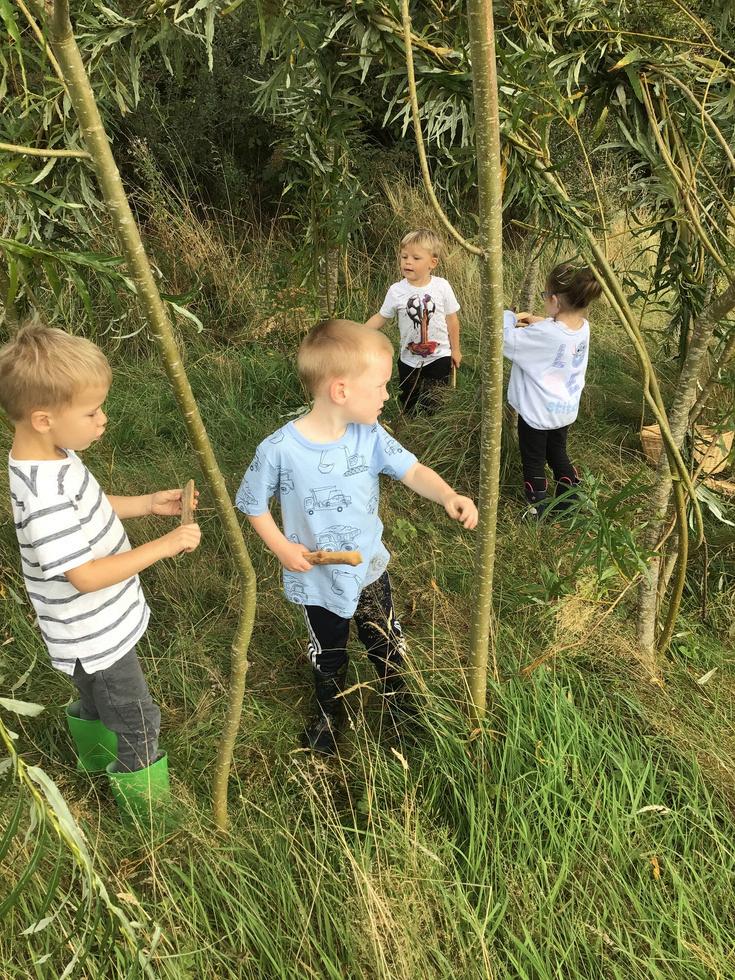
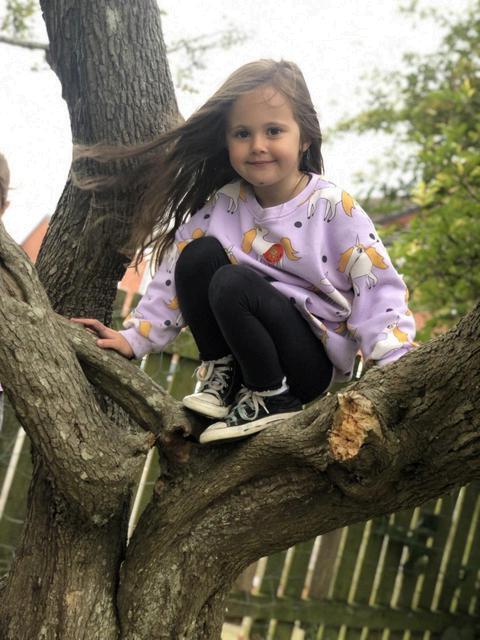
·Children are powerful learners. Every child can make progress in their learning with the right help.
·Effective pedagogy is a mix of different approaches. Children learn through play, by adults modelling, by observing each other, and through guided learning and direct teaching.
·Practitioners carefully organise enabling environments for highquality play. Sometimes they make time and space available for children to invent their own play. Sometimes they join in to sensitively support and extend children’s learning
·
·Children in the early years also learn through group work when practitioners guide their learning. ·Older children (i.e. in Reception) need more of this guided learning.
-Our regular newsletters will give you lots of ideas about how you can help support your child to learn at home.
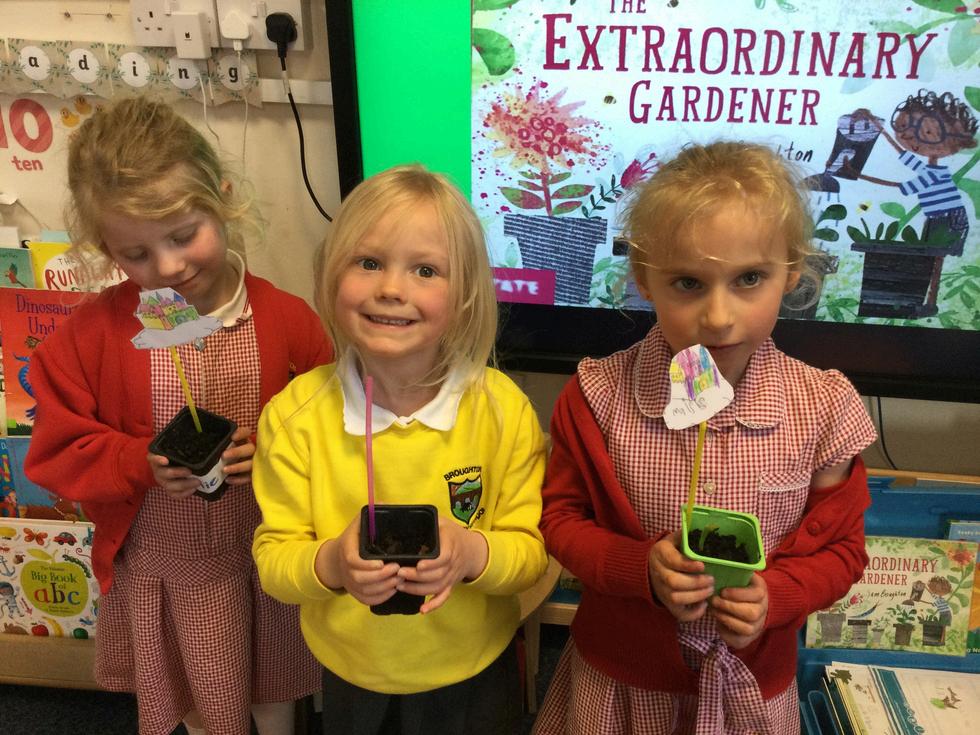
With your support we can ensure that every child becomes a fluent reader. By the end of Reception children will be bring home a range of books every week:
-A Read Write Inc phonics book
-A decodable reading book from our reading scheme
-A story book to share Phonic books will have no words initially, until children are secure with letter sounds and starting to blend.
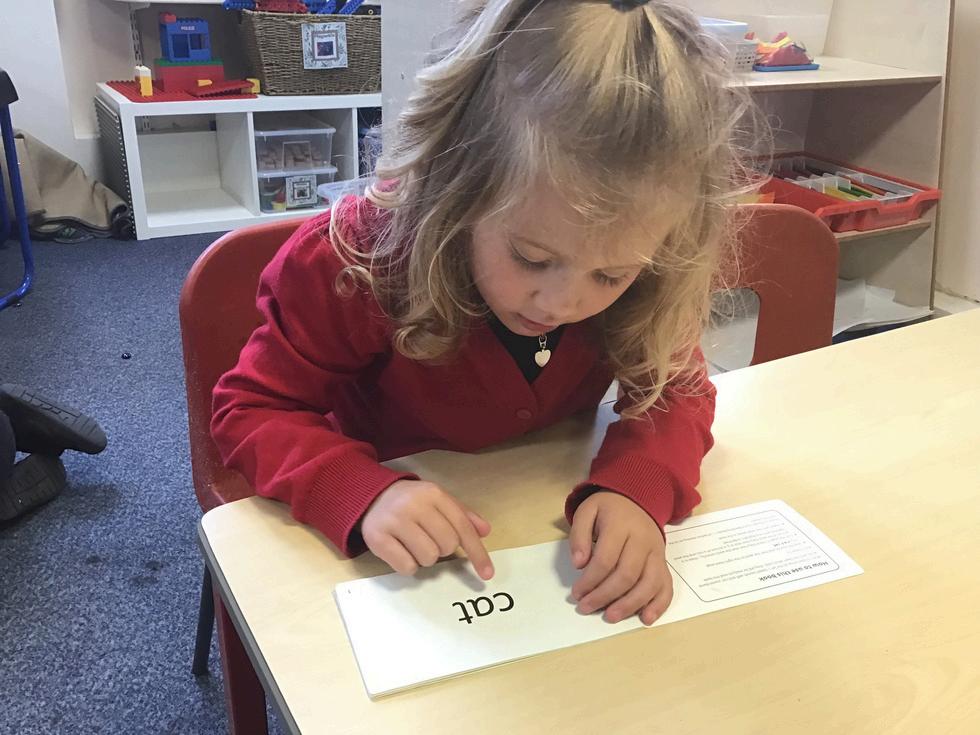
Each child will have a reading record which you sign every time you read at home & books will be changed on a weekly basis.
We celebrate reading at every opportunity with daily story times, author zooms, free book swaps & visits to the library and local bookshop.
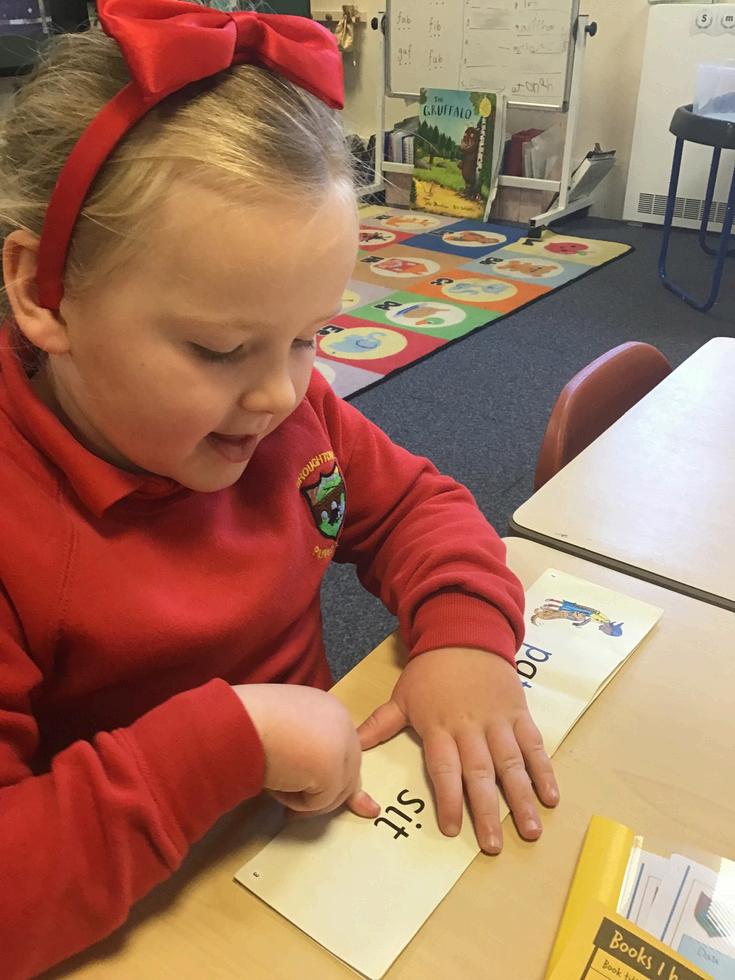
The curriculum content is carefully planned by the class teacher to meet the needs of each child in all areas of learning. Sensitive assessments are made so that careful sequencing of activities and opportunities will help children to build their learning over time. The curriculum is ambitious to enable all children to reach their full potential. Young children’s learning is often driven by their interests and so the planning is flexible in order to accommodate the particular interests and fascinations of the children.
There is a mandatory baseline assessment which must be completed within the first six weeks of a child starting in reception.
“The RBA assesses a child in early mathematics, literacy, communication and language. The purpose of the RBA is to form the starting point for cohort-level school progress measures. Data from the RBA is compared to key stage 2 outcomes 7 years later to form the overall progress measure for a school. The RBA is not used to make judgements about early years provision, either current or retrospective. It is solely intended for use within the primary school progress measure.”
(quote from the Early Years Statutory Framework)
A well-planned learning environment, indoors and outside, is an important aspect of an effective pedagogy We have a large early years classroom and an additiona classroom for Reception group work. There is a lar adjoining outdoor space, enabling free-flow provis between indoors and outdoors.
The indoor classroom is arranged into areas of pro to accommodate the range of activities that go on for example, role play, construction, painting, a maths area, a creative area, and a reading corner. There is a ‘carpet area’ and ‘cosy corner’ for large group work.
The school also has an astro-turf pitch, forest school site, eco-garden with balance trail and a large play area surrounding the school buildings. All areas are secured at all times.

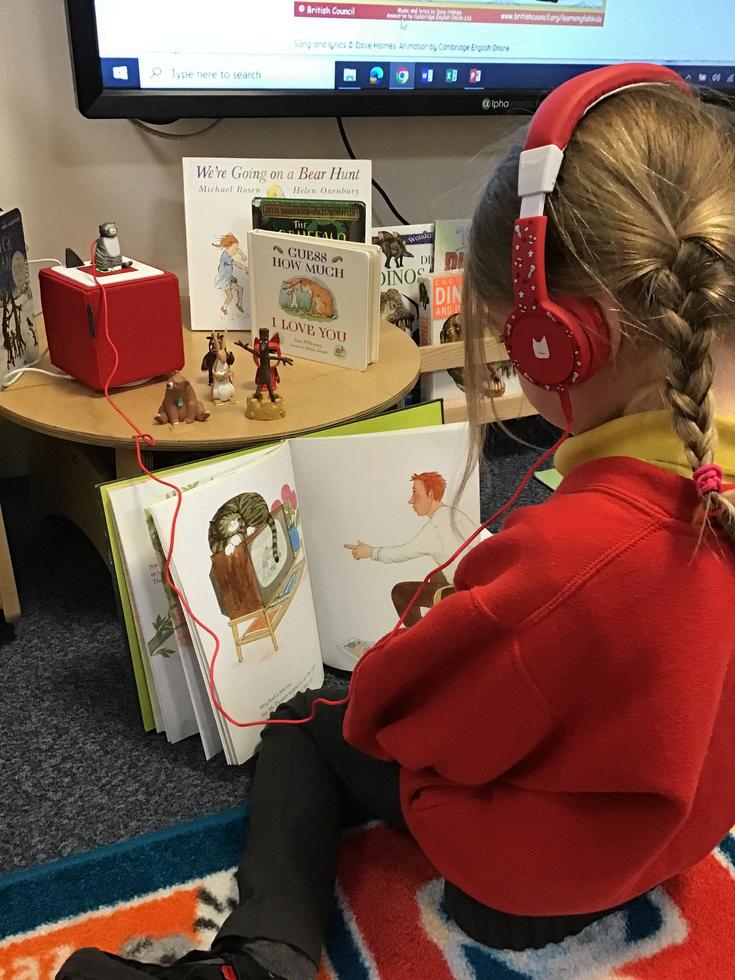
Ourschooldaystartsforeveryoneat8:45amwhenchildrencomeintoregisterand begintheirday.
NurseryChildren
Nurserychildrenwith15hoursfreechildcarecodeswillhavetheir3hourdailysessiontill 11:45am.Ifyouareeligiblefor30hoursfreechildcarethenchildrenwill stayuntil 2:45pm.Toqualifygotforthe30hoursyouneedtoregisteronlineandinformschoolof yourcode.Youareentitledtoapplyifyouandyourpartnereachearnmorethanthe equivalentof16hoursperweekatthenationallivingwageorminimumwageandearn nomorethan£100,000.Ifyouareasingleparentandmeettheabovecriteriayouwill alsobeeligibleforthe30hours.Thosenoteligiblecanalsousetheextendedprovision atacostof£4.50perhour.
ReceptionChildren
Willstartat8:45amandfinishat3:15pm.
Ourmorningsessionsincludingphonics,English,maths,snacktime,storytime, continuousprovision,outdoorplayandfocusedactivities.Ourafternoonsessionshavea differentfocuseachday:PE,cookery/gardening,understandingoftheworldsessions, expressivearts&design.
Pleasetrytobepromptwhencollectingyourchild.Childrenmaygetveryanxiousifthey arepersistentlythelasttobecollected.Ifanyone,otherthanyourself,istocollectyour childfromschoolpleaseletusknowforobvioussecurityreasons.

Class Dojo is an app we use throughout school and is one of our main forms of contact with parents. Please see the information pack about how to download the app and sign up to your child’s class (Binsey for Nursery & Catbells for Reception).
Lots of information is added to class dojo such as event reminders and celebrations. Children will be able to personalise their own dojo monster and you will be notified when your child has received dojo points from their class teacher. Please use the message feature to send in photos from home which you child might enjoy sharing with their classmates for weekly news sessions.
Dojo is also used to keep you updated on your child’s progress – each child has their own portfolio and you will get updates with photographs to show how they are progressing against the early learning goals. We welcome your comments on the profile updates to tell us how you feel your child is developing.
The school has a recommended uniform, which is: -
Girls- Dark grey/black/red tartan skirt, pinafore or tro shirt, red jumper/sweatshirt, plain red/black/grey tigh shoes/trainers.
Boys- Dark grey or black trousers, red or white polo s red jumper/sweatshirt, plain dark shoes/trainers. We do encourage all children to wear uniform, as this creates a positive school identity.
Younger children are greatly assisted if they wear clothes that are easy to manage – we appreciate slip on shoes or Velcro fastenings and zips rather than buttons.
During the summer months, plain dark knee length trousers can be worn by all children but this does not include jeans or Bermuda style shorts. Girls can also wear red checked dresses. We have a school sweatshirt, which you can purchase from Border Embroideries (www.border-embroideries.co.uk).
Children will have one taught PE session each week in the afternoons, covering either game skills, gymnastics or dance. Reception pupils will need a PE kit in school & a bag will be provided by school. Uniform is dark shorts and plain white or red t-shirt. PE kits will be returned home at the end of each half-term for washing.
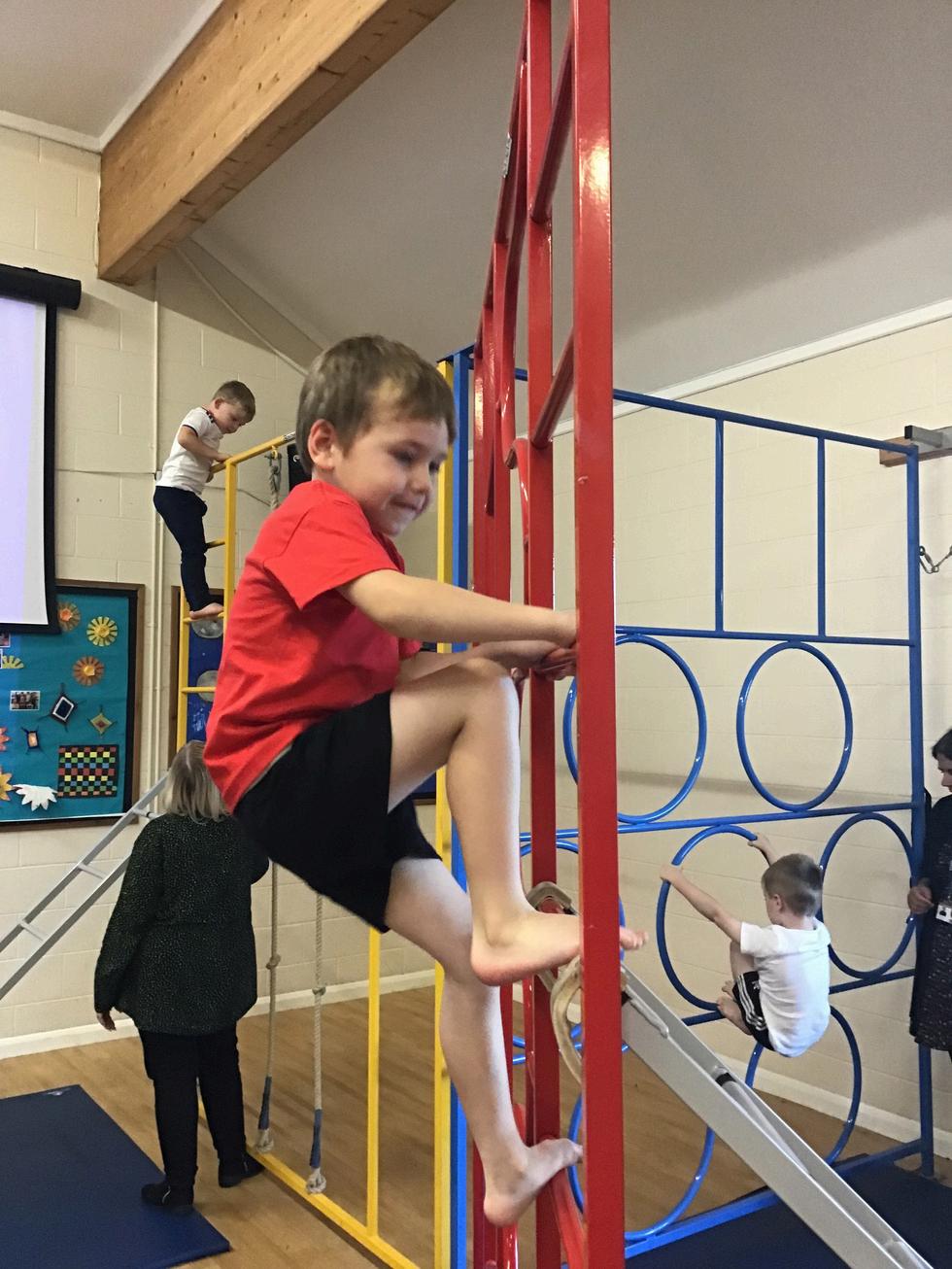
·Children will do PE outside in the summer term and will need pumps/trainers which should remain in PE bags and should be well fitted. Plain coloured socks should also be included to avoid rubbing. Jewellery should not be worn for safety reasons.
·Please encourage your child to dress and undress him/herself at home. We expect children to try themselves, but obviously always help if needed. It would be helpful if you could put easily managed clothes on your child on the days we have PE (no fiddly fastenings etc).
School dinners for all Reception children are free and are served in the school hall. ·Children have a daily choice of menu and go into lunch first. These online menus will be sent to you every 4 weeks to be completed and returned and it ensures children get exactly what they want to eat each day. Any Nursery children who are staying for the full day can purchase a school dinner for £2 (these are paid in advance on our School Money website).
Facilities are available to children wishing to bring sandwiches as part of healthy packed lunch; our guidance on a healthy packed lunch would be a sandwich/ wrap, piece of fruit or vegetables, yoghurt, a drink and a treat in the form of crisps or biscuit (no chocolate bars, sweets or fizzy drinks). We have children in school with nut allergies therefore parents must ensure that all products in their child’s packed lunch are nut free.

After they have finished their lunch children will then join the rest of the school for break time on the main playground. ·All Early Years children are linked to a ‘Buddy’ who will look after them during lunch time play as well as being supervised by staff.

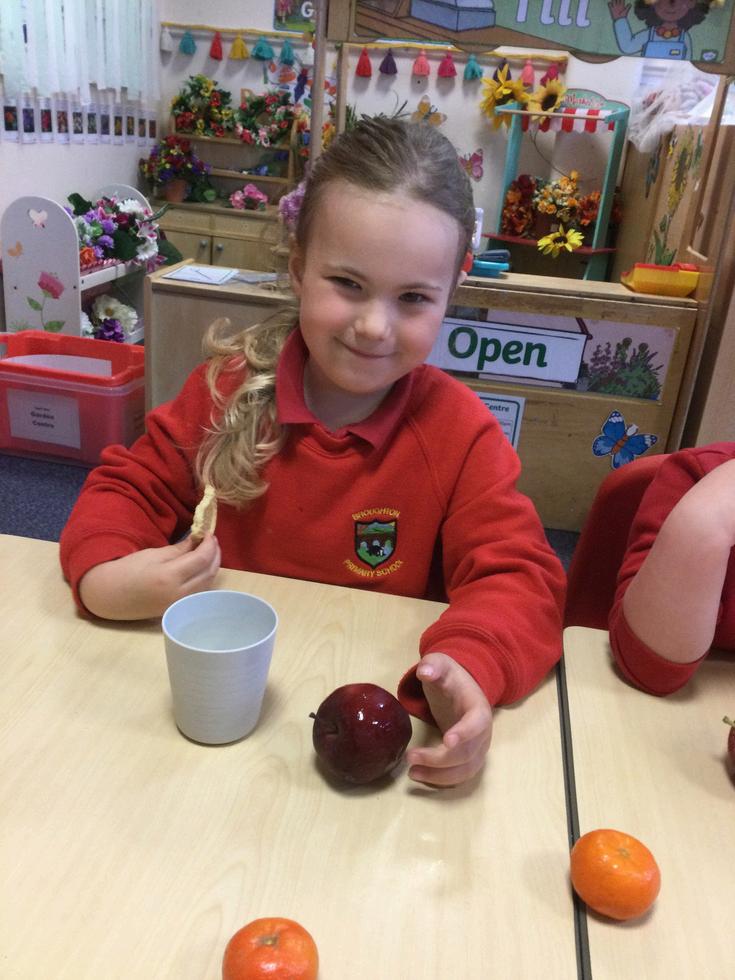
hildren enjoy a range of daily morning snacks and are ntitled to free school milk up until the age of 5. ·Different acks are provided each day as well as fruit. There is a oice of cereal, yoghurts, toast, cheese & crackers, eadsticks and dips and to cover the cost of this we ask a r termly contribution (a reminder will be sent at the eginning of each term).
l children have their own water bottle, which is sterilised aily, and they have free access to this throughout the day.
We encourage the children to be caring and nurturing towards each other in our school and the ‘Buddy Scheme’ pairs early years children and our oldest children together. The children meet up on a weekly basis to share some ‘Buddy Time’ and we enjoy a range of activities: paired reading, art activities, nature trails and games. Our children form very positive bonds with their buddies and they often play together outside during breaks together!

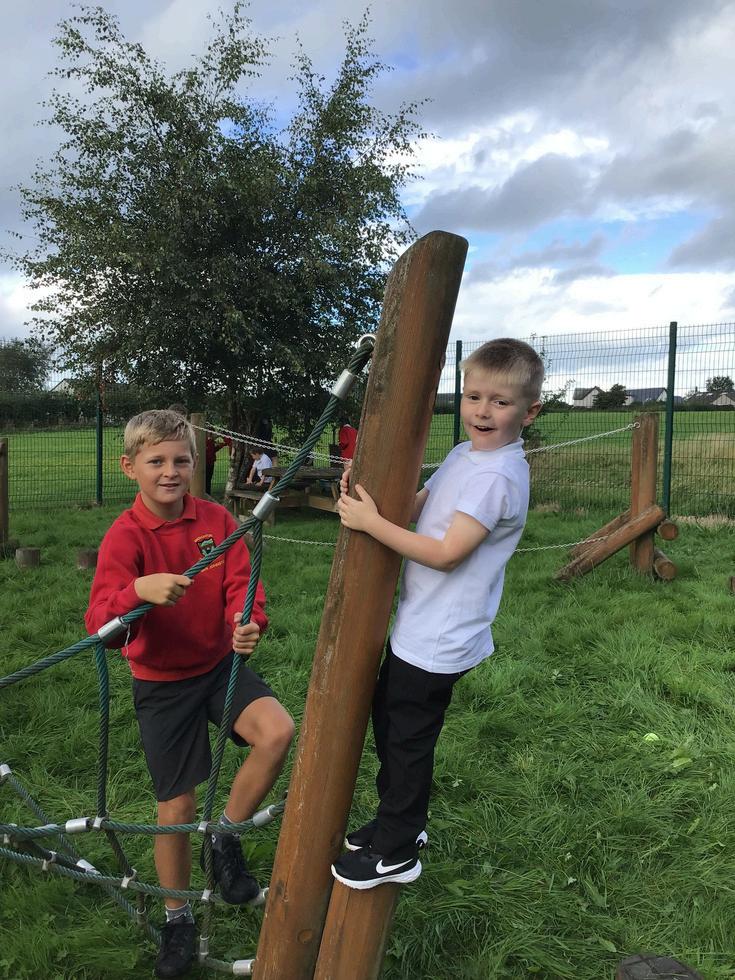
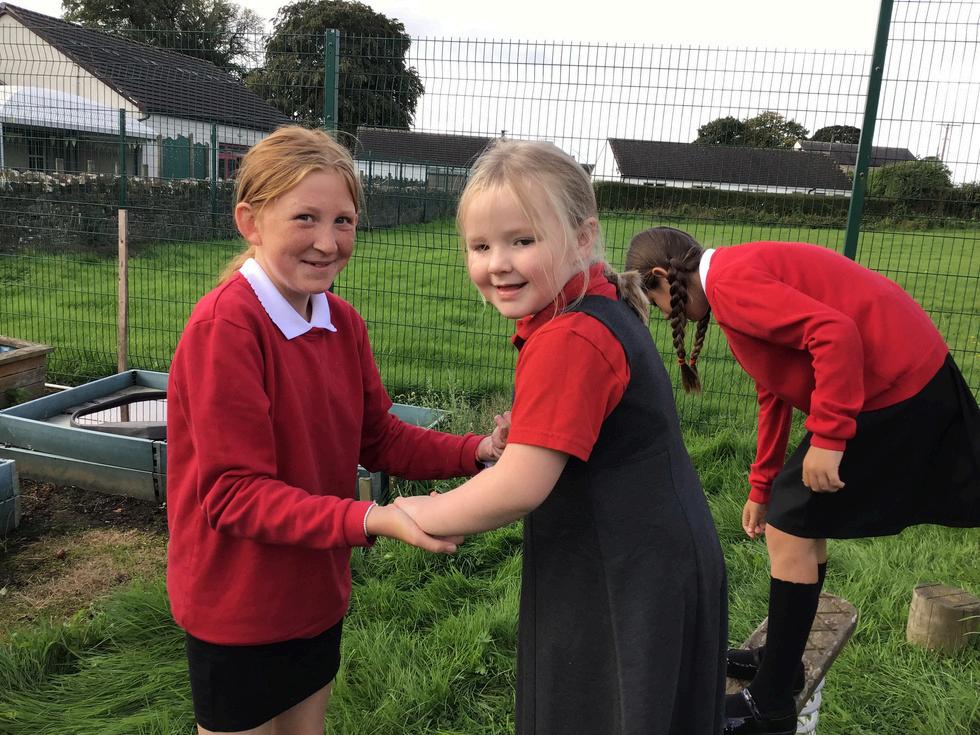
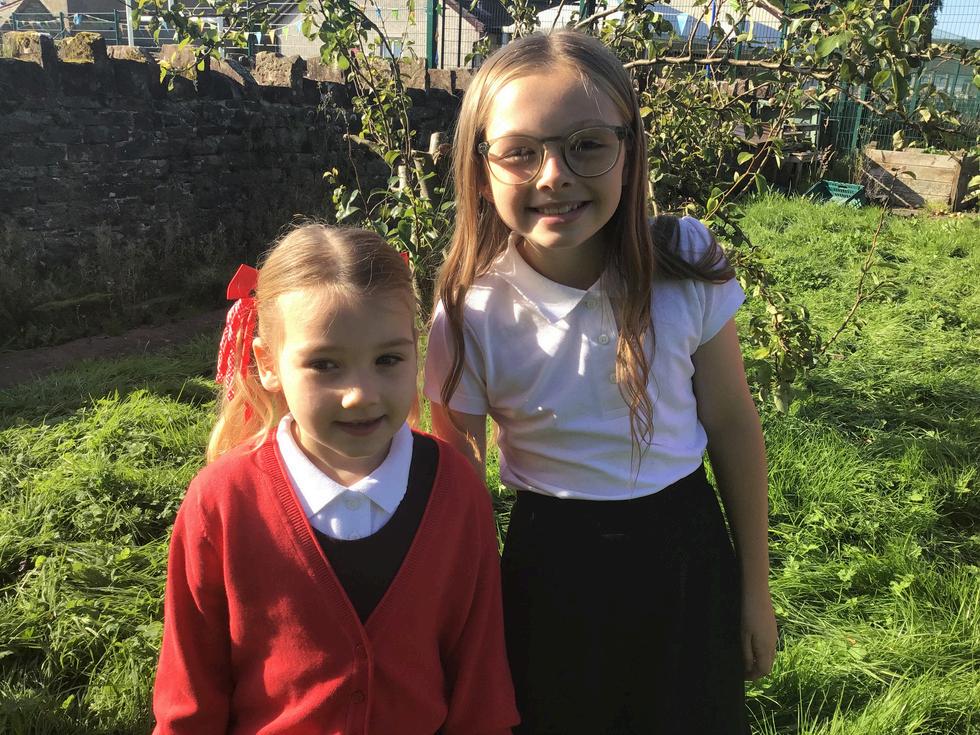
Every effort should be made for your child to be toilet trained before they start with us in Nursery. If there are concerns in this regard it can be discussed during the home visit. All children will become engrossed in an activity and forget to go to the toilet sometimes. We appreciate that accidents will always happen and we will deal with it sensitively. We ask all Nursery children to have a bag of spare clothing which is left in school - this should consist of underwear, socks, skirt or trousers. Some Reception children might also need some spare clothing but this is up to the parents discretion. We do have spare items in school but run out very quickly. If your child does come home in some school spares please can you ensure they are washed and returned.
During the summer months children in Early Years will spend increasing amounts of time exploring outdoors. It is really important that children are protected from the sun by wearing sun hats and having had sun screen applied before the school day starts.
Chat with your child about starting nursery – What will it be like? What are they excited about? What are they worried about? (if your child is reluctant to discuss nursery then don’t press them). Remember, children are experts at picking up on how their parents are feeling so try to be calm and positive when talking about school.
·Share books about starting school with your child. Some examples are:
-I am too absolutely small for school (Charlie and Lola) by Lauren Child
-Starting school by Janet and Allan Ahlberg
-Topsy and Tim start school by Jean and Gareth Adamson
-Harry and the dinosaurs go to school by Ian Whybrow
-Come to school too, Blue Kangaroo by Emma Chichester Clark
Learn to wash and dry their hands without help
Learn to go to the toilet as independently as possible
Make clothing as easy as possible for them – elastic waists rather than zips and buttons, Velcro fastening on shoes (please do not buy shoes laces, even those with laces & zips cause children to trip and fall easily and need constantly re-tieing)
Use cutlery properly (a spoon and a fork) particularly if they will be staying for lunch.
Drink from a cup without spilling.
Use a tissue to wipe their nose. Practise “catch it, bin it, kill it” and then encourage them to wash their hands.
Tidy up – practise at home by making it a game. They will be encouraged to hang their coat up, tidy toys and games away and help clear tables.
Read lots of stories and sing nursery rhymes together.
Share books and talk about the pictures, characters and story. Practice counting objects, play simple board games together, singing number rhymes.
Encourage mark making for a purpose, shopping lists, signing their name, writing messages.
Make time to talk and listen to each other, discussing your day, exploring new experiences, asking how and why questions. Encourage them to be independent in using a knife and fork, toileting and handwashing, fastening their coats and getting dressed and undressed. We will continue to support this in school so don’t worry if they’re not quite there with any of these th

Read, read, read! We cannot promote the benefits of reading enough. Encourage your child to read their school reading book (or any book) as often as possible and make comments in their reading record daily. Little and often is usually best, unless they wish to read more.
Reception children will be expected to achieve their weekly ‘Strive for Five’ which is reading at home 5 nights a week. Just a short bit of reading every day will make your child progress really quickly Children will be rewarded with 5 dojo points if they achieve their Strive for Five & their class could be weekly winners in Celebration assembly if all children take part.
Children will be given weekly activities to do at home once they are in Reception – these are short, fun activities which will mainly focus on letter & number formation and phonics. Our half termly newsletters will give you lots of ideas how you can support your child’s learning throughout our curriculum topics.
If you find you have any questions or would like to discuss anything prior to your child starting in September, please feel free to contact the school office to arrange a phone call, or contact me directly on the following email: JJohnston@broughton-pri.cumbria.sch.uk
I look forward to getting to know you and your child.
Jill JohnstonWe are an ABLE school.
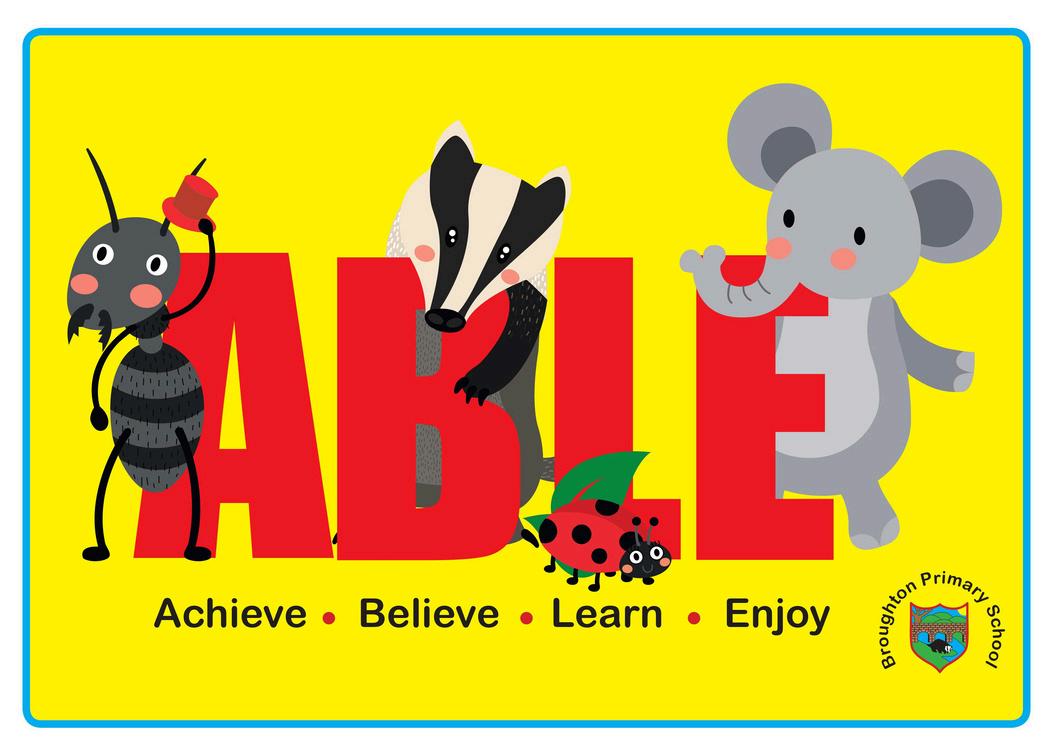
“Pupilsenjoycomingtoschool.Theyfindlearninginterestingandsay thateveryoneishappyandfriendly.”
.
It is preferable for children to attend school for every session. There are however, times when children have to miss school because of illness. On these occasions, please inform school of absences either by telephone or on the school website on the first day of absence and every day your child is off school. If we do not receive this, we will contact you. It is also helpful to inform school of dental/medical appointments prior to the visit.
If your child is involved in an accident or is taken ill, every effort will be made to contact you. It is important that you complete our school admission form naming emergency contacts when your child starts school. Please see the school website for further information.
No vehicular access is allowed onto school grounds between the hours of 8.30 a.m. and 3.30 pm An exception to this is if you hold a disabled parking badge We would be obliged if parents bringing or collecting children by car could drop them off at Moorfield Bank There have been several investigations into road safety at school, please take due care. Please do not bring cars onto the school car park; this is a real safety issue for small children who cannot be seen by drivers.
“Pupilsknowhowimportantitistoattendschoolregularlyanddonotliketomissanyschooldays
The ‘Out of School Club’ based in Broughton Primary School provides child care from 07:40 – 08:50 and 15:15 – 16:30. This is for children from Nursery to Year 6 inclusive. We provide a stimulating, caring and secure atmosphere where your child can fully develop his/her mental, physical and social skills through play activities
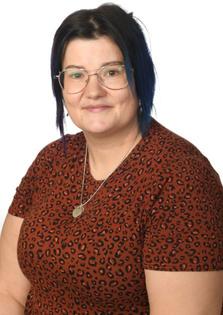
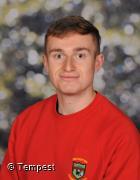
We provide numerous activities to encourage each child’s development Attending ‘Out of School Club’ helps to improve relationships and self confidence and allows children to make new friends. All children are provided with a healthy drink and snack, ensuring all their needs are met.
There is no registration fee and late bookings are accepted All of our staff are fully qualified with a First Aider on duty at all times
The cost of attending is:-
Morning session £4.00 with breakfast £4.50
Afternoon session £4 00
Cereal, toast, fruit juice and milk is offered for breakfast
We are very lucky to have a team who share a passion for arts and crafts. We have a variety of themes which we share throughout the year e.g., festivals, which is reflected in a wide range of creative activities.
The children are encouraged to play outside when the weather permits. We have a fantastic ECO area where the children can explore nature through wild life areas and activities, giving them the opportunity to get close to ‘creepy crawlies’ and wild life.
We know how important it is for parents to feel comfortable when leaving their children in the care of others We aim to include all children, regardless of their abilities, and strive to create a personalised environment, suiting their needs and interests
Amanda Cockton Play Leader